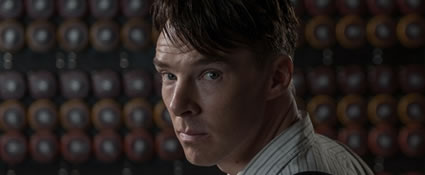Behind the scenes of the new Benedict Cumberbatch movie
The Imitation Game tells the incredible true story of Alan Turing, one of the unsung heroes of World War Two opens in cinemas this month with Sherlock star Benedict Cumberbatch in the lead role. Below screenwriter Graham Moore talks about the challenges of bringing the story to life.
Q: This story is still largely unknown, isn’t it?
Yeah, and I think that’s why we all wanted to tell it. Alan Turing is someone who should be on the front page of the history books. He should be taught in every school class. He should be on money. But he’s not because everything that he did was classified, and because he was so horribly persecuted by the government for his homosexuality. It’s an amazing story, and we are humbled to have to privilege to tell it. It’s a tremendous responsibility to bring this story to light in an appropriate way.
Q: When did you first learn about Alan Turing?
I was 14 and a huge computer nerd. I went to computer programming camp. Turin is this legend passed around among computer people for generations, from the Bill Gates and Steve Jobs of the world on down to 15 year old me. He’s the guy who secretly invented the computer, but no-one knew, and he was chemically castrated by the government.
Q: How did you approach the issue of his sexuality?
Historically, he didn’t have any lovers when he was at Bletchley. It was a period that he described as a ‘sexual desert,’ in letters. What he was doing was illegal, and he had to keep it a secret. Alan fell in love, for the first and only time, as a teenager, which we portray very graphically. I think that when you talk about gay love, the important part is the ‘love’ word, not sex. Showing the sex isn’t necessary. It’s about his love for someone else, not about the physical act of it. We just wanted to make a movie about a mathematician who happens to be gay, and not a gay mathematician.
Q: Why has it taken so long for all of this to come to light?
It’s amazing for the people of Bletchley Park to be able to keep this secret for 30, 40, 50 years in a lot of cases. Think about all the secrets Alan Turing was keeping when he was going in front of a judge and being sentenced for ‘Gross indecency’, the crime of having had sex with a man. He could have raised his hand and said, ‘I’m a war hero. I broke this code. Call MI6, call MI5.’ But he didn’t. He kept the secret. It’s remarkable.
Q: Had you started writing the script before Gordon Brown made his apology for the treatment of Turing?
That had already happened. Nora [Grossman] and Ido [Ostrowsky], our producers,had first heard about the story when Gordon Brown apologised, and they were like, ‘Who is this person? That’s a really interesting story.’ They researched it and optioned the biography, and then I got the opportunity to come on, through them. It was this dream opportunity, the once-in-a-lifetime chance to write this story.
Q: Did you change any details from Turings life?
People are always like, ‘What have you made up?’ Yes, we did change little things, but every major point of the story is true. Every time anyone says, ‘Turin didn’t really write a letter to Winston Churchill, did he?’ Yes he did, that’s a true story. People say, ‘There wasn’t really a Soviet double agent at Bletchley Park, who MI6 had intentionally planted there, and who they knew was leaking the whole time?’ Yes, there was, it’s a true story. The most outlandish bits are the moments that are completely true.
Q: We can only wonder what this man might have achieved, had he lived longer.
Yeah, he died at 41, which is so shocking. And that’s one of the things that I think is so amazing about the movie. It makes you think about what wonders we might have lost in the world because of the way we treated homosexuals. The character of Joan, Keira Knightley’s character, certainly makes me think of how many other potentially once-in-a-generation geniuses were held back because they were a woman, and weren’t allowed to be a full professor at Cambridge. You see what homophobia and sexism institutionally did to generations of other possible geniuses who might have accomplished so much.
THE IMITATION GAME is at cinemas from Nov 14th


